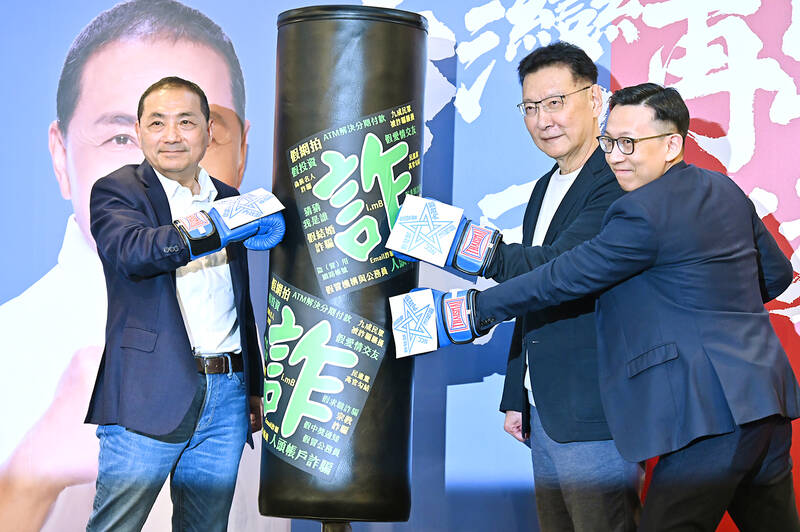New Taipei City Mayor Hou You-yi (侯友宜), the Chinese Nationalist Party’s (KMT) presidential candidate, yesterday said he supports maintaining close relations with the US while keeping a peaceful relationship with China, adding that President Tsai Ing-wen’s (蔡英文) foreign policy has cost the country multiple allies and made it unable to join regional economic organizations.
Hou and his running mate, Jaw Shaw-kong (趙少康), at a news conference in New Taipei City also vowed to impose tougher sanctions on scammers.
Asked on the sidelines to comment on Taiwan People’s Party (TPP) Chairman and candidate Ko Wen-je’s (柯文哲) plan to follow Tsai’s foreign policy, Hou said that he opposes China’s “one country, two systems” policy and would defend Taiwan’s freedom, democracy and sovereignty, but would not support independence.

Photo: Tu Chien-jung, Taipei Times
“My position is that we should maintain close relations with the US while keeping a peaceful relationship with China. We should remain a strong ally to the US, but we also need to communicate and increase mutual understanding with China,” Hou said.
“The balance of cross-strait relations has been disrupted because of the Democratic Progressive Party’s (DPP) foreign policy. People now fear an imminent war,” he added, calling Tsai’s foreign policy a “complete failure.”
“In the past seven years, Taiwan has lost multiple allies. There is no communication, no dialogue and no exchanges between Taiwan and China, either,” Hou said.
“Because of the DPP government’s error, we cannot join the Regional Comprehensive Economic Partnership or the Comprehensive and Progressive Agreement for Trans-Pacific Partnership. This shows that the nation needs an adjustment in the direction of foreign policy, because what Tsai has done clearly did not work,” he said.
Facing the military threat from China, Taiwan must not harbor any impractical thoughts, he said.
“The safety of Taiwan does not depend solely on the promises made by the US. We must have a practical view of our relations with China and democratic allies,” he added.
During the news conference, Hou vowed to launch a massive crackdown on scammers during the first year of his presidency if elected, and to reduce scam cases by half by his third year.
A rise in scams has also contributed to an increase in other organized criminal activity, including drug trafficking, he said.
The DPP government has spent NT$2.7 billion (US$85.6 million) cracking down on scams, but cases continue to rise from about 20,000 last year to 30,000 this year, Hou said.
About 46,000 suspects were arrested last year alone for alleged involvement in scams, he added.
Hou touted his record of reducing violent criminal cases when he headed the National Police Agency, first by extensively investigating vehicle thefts.
Hou attributed the continual rise in scam cases to light sentencing and a lack of coordination among government agencies.
Once convicted, only about 0.5 percent of scammers are sentenced to three years in prison or longer, even if the money involved was in the billions, he said.
“If elected, I propose that individuals or organizations participating in scams will be subject to criminal liability, under which penalties should be raised 50 percent. The same penalty would apply to those who repeatedly let scammers use their bank accounts for money-laundering purposes,” he said.

An essay competition jointly organized by a local writing society and a publisher affiliated with the Chinese Communist Party (CCP) might have contravened the Act Governing Relations Between the People of the Taiwan Area and the Mainland Area (臺灣地區與大陸地區人民關係條例), the Mainland Affairs Council (MAC) said on Thursday. “In this case, the partner organization is clearly an agency under the CCP’s Fujian Provincial Committee,” MAC Deputy Minister and spokesperson Liang Wen-chieh (梁文傑) said at a news briefing in Taipei. “It also involves bringing Taiwanese students to China with all-expenses-paid arrangements to attend award ceremonies and camps,” Liang said. Those two “characteristics” are typically sufficient

The brilliant blue waters, thick foliage and bucolic atmosphere on this seemingly idyllic archipelago deep in the Pacific Ocean belie the key role it now plays in a titanic geopolitical struggle. Palau is again on the front line as China, and the US and its allies prepare their forces in an intensifying contest for control over the Asia-Pacific region. The democratic nation of just 17,000 people hosts US-controlled airstrips and soon-to-be-completed radar installations that the US military describes as “critical” to monitoring vast swathes of water and airspace. It is also a key piece of the second island chain, a string of

A magnitude 5.9 earthquake that struck about 33km off the coast of Hualien City was the "main shock" in a series of quakes in the area, with aftershocks expected over the next three days, the Central Weather Administration (CWA) said yesterday. Prior to the magnitude 5.9 quake shaking most of Taiwan at 6:53pm yesterday, six other earthquakes stronger than a magnitude of 4, starting with a magnitude 5.5 quake at 6:09pm, occurred in the area. CWA Seismological Center Director Wu Chien-fu (吳健富) confirmed that the quakes were all part of the same series and that the magnitude 5.5 temblor was

The Central Weather Administration has issued a heat alert for southeastern Taiwan, warning of temperatures as high as 36°C today, while alerting some coastal areas of strong winds later in the day. Kaohsiung’s Neimen District (內門) and Pingtung County’s Neipu Township (內埔) are under an orange heat alert, which warns of temperatures as high as 36°C for three consecutive days, the CWA said, citing southwest winds. The heat would also extend to Tainan’s Nansi (楠西) and Yujing (玉井) districts, as well as Pingtung’s Gaoshu (高樹), Yanpu (鹽埔) and Majia (瑪家) townships, it said, forecasting highs of up to 36°C in those areas